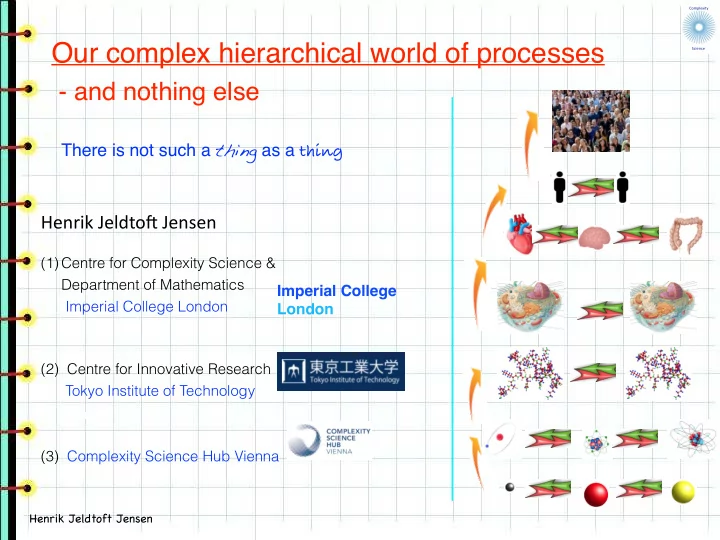

Complexity Our complex hierarchical world of processes Science - and nothing else There is not such a thing as a thing Henrik Jeldto- Jensen (1) Centre for Complexity Science & Department of Mathematics Imperial College Imperial College London London (2) Centre for Innovative Research Tokyo Institute of Technology (3) Complexity Science Hub Vienna Henrik Jeldtoft Jensen
Complexity Imperial College London Science Complexity Science — both the most fundamental and the most applied of sciences. Applied addresses the most urgent scientific and societal problems we face today Fundamental pushes the frontier of science by developing concepts, language and formalism to help us understand systems The Vienna hub’s quest is a continuation of Boltzmann’s work in Vienna around 1900. Henrik Jeldtoft Jensen
Complexity Imperial College London Science How is this done Applied Through collaborative research: complexity learns from and contributes to our understanding of the most basic aspects of finance economics neuroscience ecology … Fundamental To understand the typical behaviour of such systems, complexity science investigate concepts such as emergence synergy co-evolution collective dynamics bottom-up versus top-down …. Henrik Jeldtoft Jensen
Complexity Imperial College London Science How is it possible? The building blocks of the world How can general rules govern diverse systems such as an ecosystem a network of financial agent the brain … Because the world consists of processes - not things At the most basic level a “thing” like an atom a human the brain a company consists of hierarchically structured processes, not of balls, springs and levers. Henrik Jeldtoft Jensen
Complexity The Complexity subfields Science Science Sociology θ 7 Psychology θ 6 θ 6 θ 5 θ 5 θ 5 Physiology Cell biology θ 4 θ 4 Proteins θ 3 θ 3 θ 2 θ 2 θ 2 Atoms θ 1 θ 1 θ 1 Particles Henrik Jeldtoft Jensen
Complexity Imperial College London Science Complexity science is the science of the laws governing the dynamics of interrelated processes. Long, but sparse, history Aristotle: The whole is greater than the sum of the parts Marx: Merely quantitative differences, beyond a certain point, pass into qualitative changes. Anderson: More is different Or according to Niels Bohr the wetness of water “emerges” out of the proper combination of hydrogen and oxygen and cannot in principle be found or predicted by analysing those chemicals individually … RH Jones: Reductionism: Analysis and the Fullness of Reality Henrik Jeldtoft Jensen
Complexity Imperial College London Science Complexity Science achievements Goes beyond the cross disciplinary collaboration Beginning to identify general laws of complex systems One example: Self-organisation towards dynamics characterised by scaling: self similarity (brain structure, financial fluctuations, precipitation, …) adaptation co-evolution brings about (economics, cancer growth, …) intrinsic instability (economic crashes, ecosystems collapse, … the exogenous endogenous (dynamics of finance, brain, fossil record, …) Henrik Jeldtoft Jensen
Complexity Imperial College London Science Complexity Science achievements Specific examples Papers Neuroscience: self-similar brain P. Massobrio, L de Arcangelis, V. Pasquale, H.J. Jensen and D. Plenz, Criticality as a signature of the healthy neural systems. (Editorial), frontiers in Systems Neuroscience. 25 Feb. 2015, doi: 10:3389/fnsys.2015.00022. 25 Years of Self-Organised Criticality: Solar and Astrophysics Markus J. Aschwanden · Norma B. Crosby · Michaila Dimitropoulou · Manolis K. Georgoulis · Stefan Hergarten · James McAteer · Alexander V. Milovanov · Shin Mineshige · Laura Morales · Naoto Nishizuka · Gunnar Pruessner · Raul Sanchez · A. Surja Sharma · Antoine Strugarek · Vadim Uritsky Space Sci Rev (2016) 198:47–166 DOI 10.1007/s11214-014-0054-6 Conference Cancer: tumour growth - evolution Quantifying the evolutionary dynamics of tumor growth and metastasis Cancer evolution and metastasis: From single cells to population dynamics Henrik Jeldtoft Jensen
Complexity Imperial College London Science Complexity Science the fundamental science enabling the subject specific sciences somewhat similar to mathematics understanding emergence COMPLEXITY Henrik Jeldtoft Jensen
Complexity Imperial College London Science Henrik Jeldtoft Jensen
Complexity Imperial College London Science Henrik Jeldtoft Jensen
Complexity Imperial College London Science Henrik Jeldtoft Jensen
Recommend
More recommend